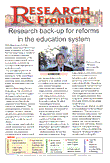 |
Baptist University

Researchers recently concluded laboratory tests which show that offending polychlorinated biphenyls (PCBs) can be "eaten" by micoorganisms obtained from Hong Kong's sediments and soils.
PCBs were banned in the late 1970s after being widely used in industry for about 50 years. They had useful properties such as chemical and thermal stability, and high flame resistance, and were used in fluids for capacitors and transformers, heat transfer fluids, lubricating oils, and as additives in pesticides, paints, copying paper, adhesives, sealants, and plastics.
Researchers have found concentrations of PCBs in Victoria Harbour and other marine coastal sites around Hong Kong. "Compared to other common pollutants, the major environmental concern of PCBs is their environmental persistence, bioaccumulation, biomagnification, and widespread contamination," said Principal Investigator Dr Dingyi Ye.
By bringing PCBs together with some anaerobic microorganisms to react anaerobically, researchers found that the anaerobic microorganisms removed chlorines from PCBs and converted the harmful PCBs into non-toxic products. These products were then completely degraded by bringing them into oxygen and contact with certain aerobic microbial strains such as burkholder capacia and salmonella sp.
Said Dr Ye: "This provides a promising solution to clean up Hong Kong's marine environment with its threat to the natural ecosystems and public health. "It's hard to say how much this would cost, however I'd say the biological option is the least cost option."